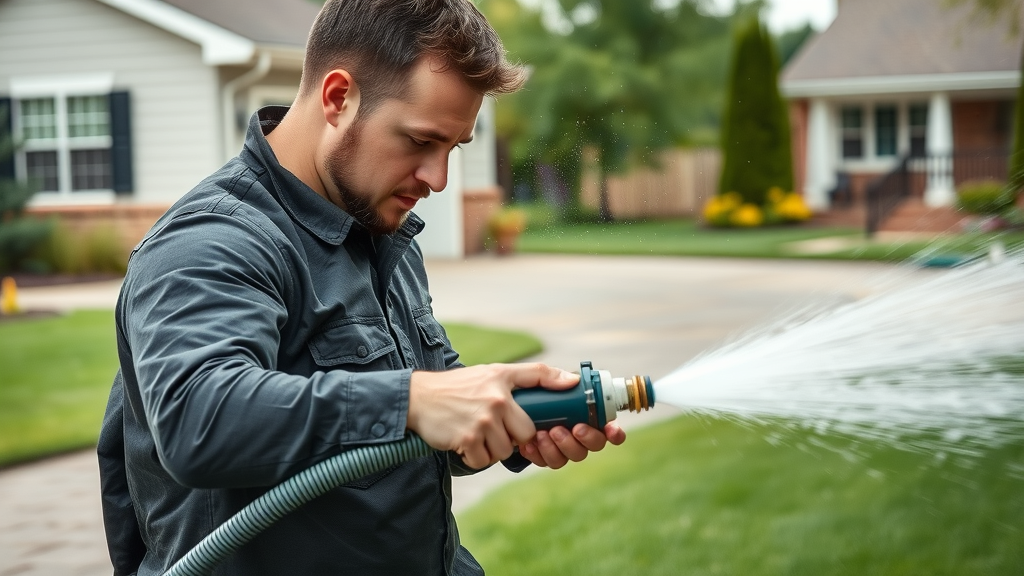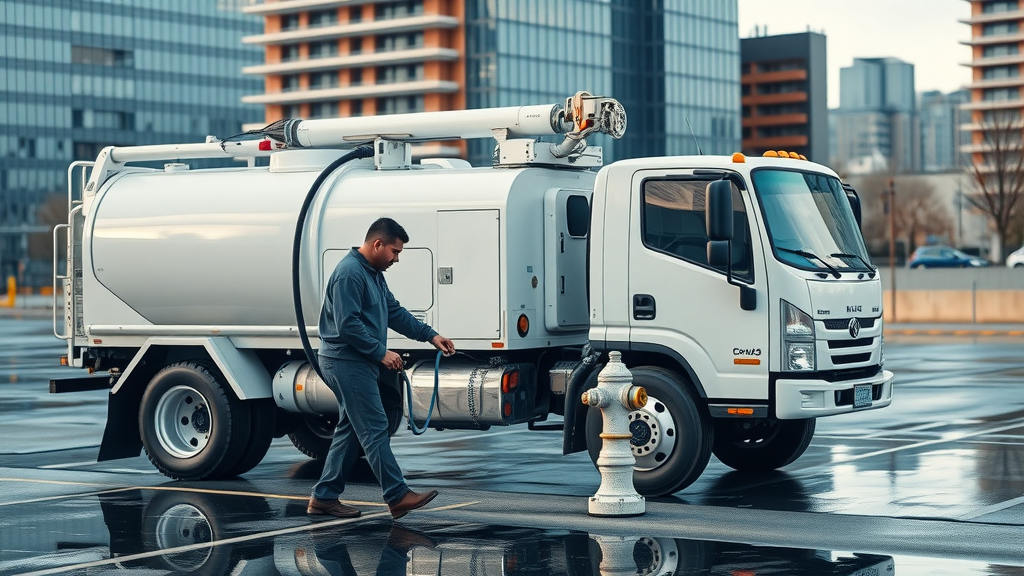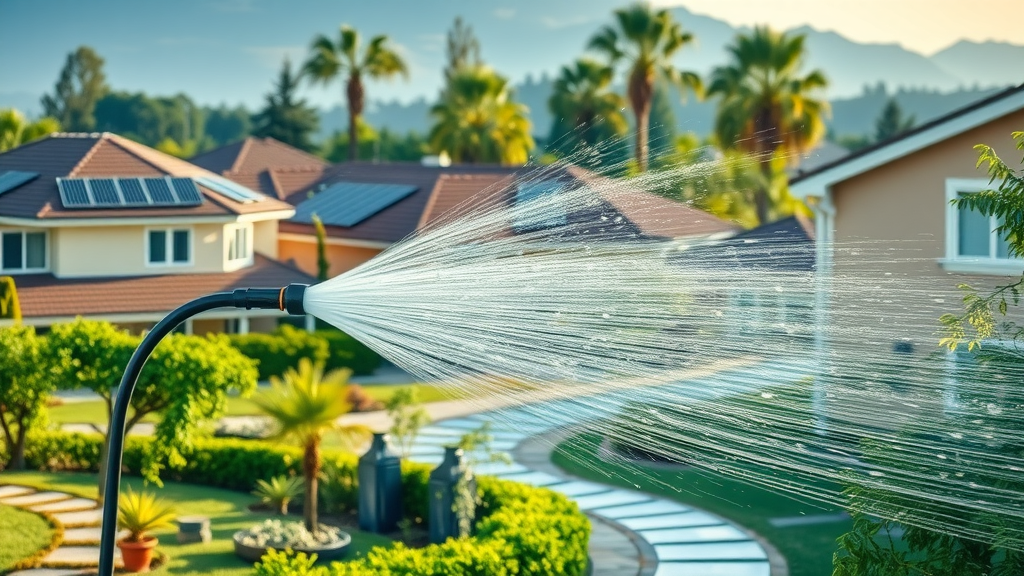Have you ever wondered, “Do power washing companies use their own water, or do they rely on your home’s supply?” Homeowners are often surprised to discover the answer is not as clear-cut as it seems. With rising water bills and environmental awareness on everyone’s minds, understanding the ins and outs of power wash practices is more important than ever. In this detailed guide, we’ll unveil exactly how professional washing companies source their water, what it means for your wallet, and why this seemingly simple detail can impact the quality and cost of your next power washing job. Read on to be empowered with everything you need to know before booking a washing service!

Understanding Whether Power Washing Companies Use Their Own Water: An In-Depth Look
The query “ Do power washing companies use their own water ?” touches on much more than mere logistics. For homeowners eager to protect their water bill and ensure efficient service, understanding who provides the water source during a professional power wash is crucial. Some pressure washing companies hook up directly to your outdoor water spigot, while a few may bring their own water tanks—especially in remote areas, or for large commercial jobs.
Knowing whether companies use your water or bring their own can affect scheduling, preparation, and overall cost. For example, if a washing company uses your municipal water via an exterior faucet, you might see a slight spike in your next water bill, especially with large area cleaning jobs. On the other hand, mobile units with onboard water tanks offer flexibility but may entail an additional fee for the convenience and logistics. Ultimately, every power washing service operates differently, so it’s vital to ask about water sourcing before booking.
Curiosity Unveiled: Why the Question ‘Do Power Washing Companies Use Their Own Water’ Matters
This question isn’t just about water logistics. It reflects deeper concerns for property owners, such as protecting landscaping, budgeting for the potential extra gallons of water used, and understanding the impact on the environment. When you book a pressure washing company, you want predictable results and no surprises relating to your resources. The answer also signals how prepared, professional, and customer-focused the company is—clear communication on water source use is a hallmark of reputable washing companies .
- What You'll Learn Today:
- The common practices of power washing companies and their water use
- Differences between water sources utilized
- How pressure washing impacts your water bill
- What to expect from a professional washing service
How Power Washing Companies Source Water: Exploring Company Practices and Options
Power washing companies adopt a variety of approaches when it comes to water sourcing. Traditionally, residential pressure washing jobs connect equipment directly to your outdoor faucet, tapping into your local water supply. This method is straightforward, convenient, and allows for continuous operation without refueling or downtime. However, many pressure washing companies , especially those serving commercial or large-scale clients, have upgraded fleets with mobile water tanks. These tanks allow them to operate in locations where municipal water isn’t easily accessible.
In recent years, the rise of eco-friendly washing services has introduced recycled water systems, further diversifying company policies around water logistics. These innovative solutions not only help conserve valuable resources but can also appeal to environmentally-conscious customers seeking modern alternatives to traditional pressure washing. Ultimately, the chosen water source depends on company policy, job requirements, local regulations, and customer needs.
Understanding Water Source Logistics for Power Washing and Pressure Washing
Managing the water source is a top priority for every power washing company . Most washing services rely on a straightforward process—using the client’s water spigot as the primary water supply, which ensures steady pressure and unlimited flow. In contrast, mobile service providers may bring water tanks when access to running water is limited, such as on construction sites or in rural areas.
The type of task also affects sourcing: large commercial power wash projects, where thousands of gallons of water might be needed, may demand specialty setups with water tanks or access to hydrants. In all cases, companies strive to balance efficiency, convenience, and customer communication. Clear, upfront disclosures help build trust and prevent unexpected surprises on your water bill.

Do Power Washing Companies Bring Their Own Water to the Job Site?
While the majority of washing companies use the customer’s supply for standard residential pressure wash jobs, there are cases where they bring their own water. Some companies operate trucks equipped with large water tanks , providing a portable water source when infrastructure is lacking. This is common for multifamily residences, areas with no exterior spigot, or municipal and industrial contracts.
Bringing their own water adds convenience for tricky locations but may affect pricing —often incurring an additional fee for transporting and handling water tanks. If you're hiring a company for a remote job, always ask whether they plan to bring their own water or need access to your supply to prevent confusion and delays.
Washing Company Policy: Do Companies Use Your Water or Provide Their Own?
The answer depends on the specific washing company and the nature of the project. Most residential pressure washing companies prefer using the client's water, as it is more efficient and scalable for routine home maintenance jobs. Larger or more specialized jobs—like commercial power washing, fleet cleaning, or disaster site work—may require a mobile water source provided by the company.
The best practice is for the company to clarify their policy well before service begins. This ensures both efficiency in cleaning and transparency for you, the client. Remember: always ask if companies use your water or provide their own, so you’re aware of potential implications for your property and utility costs.
| Method | Water Source Used | Common With Residential? | Impacts on Water Bill |
|---|---|---|---|
| Standard Pressure Wash | Client’s Water Supply | Yes | Can increase |
| Mobile Tank Power Washing | Company-Provided | Less common | No effect |
| Eco-Friendly Washing Service | Recycled Water | Emerging trend | Minimal effect |
Power Wash and Pressure Wash: Impact of Water Source Choice
The choice between client-supplied or company-provided water affects efficiency, cost, and sometimes even the outcome of a power wash . For traditional residential jobs, using the onsite water source is usually the most convenient—for both homeowner and company. However, for sites where water supply is inconsistent or unavailable, companies that bring their own water offer the reliability needed to complete the job seamlessly.
The rise of eco-friendly washing services is also shaping the industry. Some companies now use recycled water systems for certain jobs, reducing environmental impact and lowering dependence on municipal water. No matter the method, understanding the water source is crucial for budgeting and planning.
Traditional Pressure Washing vs. Modern Power Washing Company Approaches
In traditional pressure washing, contractors connect their equipment—usually high-powered pressure washers —to a readily available spigot on the property. Modern approaches vary; some companies utilize water-efficient machines, innovative soft washing techniques, or even closed-loop filtration systems that recycle water for repeated use. These advances not only conserve water but also protect landscaping and hardscaping from unnecessary run-off.
As clients become more environmentally aware, some power washing companies market eco-friendly washing, offering both efficiency and sustainability. The takeaway: not all washing companies are created equal in their approach to water usage, and the right company will match the service to your specific site needs.
How Much Water Do Pressure Washers Use? Evaluating Water Conservation and Efficiency
The amount of water used during a standard pressure wash can be surprising. A typical pressure washer uses anywhere from 2 to 8 gallons of water per minute, depending on the machine’s size and settings. For example, cleaning a medium-sized driveway might consume 200-400 gallons of water, while more extensive projects like siding or decks require even more.
Water conservation is achievable with modern pressure washers—many are designed for high efficiency, providing powerful cleaning with less water usage. Inquire with your power washing company about their equipment; pressure washing technology has come a long way, and newer machines can deliver a sparkling clean while minimizing water waste.
- Factors That Influence Water Use:
- Size of Area Cleaned
- Type of Washing Services Used
- Equipment (Pressure Washer Type)
Examining Washing Service Terms: Does a Power Washing Company Use Client Water?
Clarity is key in every washing service agreement. Most washing companies will detail water sourcing terms before starting work. However, it’s up to the client to ask pointed questions and address any concerns about their water supply . For the best possible outcome, verify policies on water usage at the quoting or booking stage.
Reviewing Typical Washing Company Agreements and Expectations
A professional pressure washing company will explain in writing what’s expected: whether you’ll need to ensure access to your outdoor water spigot, or if the team brings a water tank along. Pay attention to specifics—some companies stipulate a minimum flow rate or pressure is needed for the job, and will advise of any adjustments needed depending on your site.
Ultimately, the foundation of any successful power washing service is open, honest communication. If a company doesn’t clarify their policy on water use, it may be a red flag to keep looking.
What Does It Mean for Your Water Bill if Companies Use Your Water for Pressure Washing?
If companies use your water during a power wash, expect to see an increase in your next utility statement—though usually not a dramatic one. The total increase depends on the job’s size, but most residential washes do not use enough water to cause budget strain. Large, multi-day washes may noticeably raise your water bill, so clarify expectations before the work begins.
For cost-conscious homeowners, ask for an estimate of how many gallons of water will be required, especially for bigger projects. Some companies will offset this by using high-efficiency machines or soft washing for certain materials, which consumes less water overall.
"Most professional power washing companies will clarify water source requirements in advance, ensuring no surprises for the client."
Real-World Scenarios: Pressure Washing Companies and Their Water Sources
The variety of water sourcing strategies in the power washing industry is vast. While the majority of residential washing services rely on client-supplied water, exceptions abound—particularly in commercial, construction, or eco-conscious sectors. Let’s explore some industry insights and a real-life case study.
Insights from Industry Experts on Power Washing and Pressure Washing Practices
Industry professionals agree: communicating water logistics up front is non-negotiable for building trust and achieving top-tier results. From coordinating municipal water access for apartment complexes to handling water tanks for off-grid sites, adaptable strategies keep washing projects efficient.
Leading washing companies also note that newer machines and eco-friendly practices are helping curb unnecessary water usage—good for the planet and to ease worries about property owners’ water bills.
Case Study: Does Perfect Power Wash Use Their Own Water?
Perfect Power Wash , a major name in the industry, follows the standard residential model by using the homeowner’s water supply for most jobs. For special commercial projects or unique site challenges, they may bring water tanks, but this is clearly communicated in advance to avoid confusion.
This approach highlights the industry norm: residential clients should be prepared to provide water, with rare exceptions handled case-by-case.

"Every washing service should communicate transparently about logistics, including who supplies water for the job." – Industry Leader
People Also Ask
Where do pressure washing companies get their water from?
Answer: Pressure washing companies typically source water from either the client’s external spigot (municipal water supply) or bring their own tanks if the location lacks access, depending on company policy and job requirements.
Does Perfect Power Wash use their own water?
Answer: Perfect Power Wash generally uses the homeowner’s water supply for residential jobs. For unique commercial circumstances, they may provide their own water tanks if necessary, but this is clarified before service begins.
Do you use people's water when pressure washing?
Answer: Most pressure washing services use the property owner’s water for convenience and efficiency, though some mobile units can bring water if informed during booking.

Why do most pressure washing businesses fail?
Answer: The main reasons include underestimating operational costs (including water logistics), lack of reliable equipment, insufficient marketing, and not clearly communicating key policies to clients.
Essential Considerations Before Booking a Power Washing Service
Before hiring any power washing company , it’s wise to cover some basics. Understanding water logistics not only helps you prepare, but also lets you gauge a company’s professionalism. Clear expectations on water source, access, and potential effects on your water bill are key to a smooth service experience.
Questions to Ask About Power Washing Companies and Water Source Needs
Use the following checklist to ensure you’re fully informed before making your decision:
- Clarify if the company will use your water supply or provide their own.
- Ask about potential effects on your water bill.
- Discuss any site-specific limitations or preferences.
- Request company insurance and professional references.
Best Practices: Working Efficiently with Professional Power Washing Companies

How to Prepare Your Home for a Professional Washing Service
Proper preparation ensures your power washing session is fast, efficient, and stress-free—for both you and the crew. Anticipating the need for a water source is just the first step.
- Identify accessible water spigots for the crew.
- Remove obstacles from wash areas.
- Notify company in advance about water supply concerns.
- Secure pets and valuables indoors.
Frequently Asked Questions About Power Washing Companies and Water Source Use

Can power washing companies supply their own water for remote jobs?
Yes, some power washing companies have trucks or trailers with large water tanks to serve remote or infrastructure-limited properties. This option is typically used for commercial or rural jobs, and should be requested when scheduling service.
How does bringing their own water impact the price of washing services?
Having a company bring their own water often adds an additional fee to your estimate, reflecting the costs of transporting, storing, and maintaining the water tanks and specialty equipment.
What happens if water access is unavailable at my property?
If no water access is available, professional companies will either reschedule or arrive with a mobile tank. Always alert your provider during booking for alternative water logistics.
Are there environmental concerns with water usage by power washing companies?
Yes, excessive water use and improper disposal can be concerns. Ask about eco-friendly techniques and water recycling practices to minimize the environmental footprint of your washing service.
Summary of Key Takeaways for Choosing Power Washing Companies and Understanding Water Policy
- Always verify the water source policy with your proven washing company.
- Clarify any possible effects on your water bill.
- Consider the type of pressure washer and services offered for more efficient water use.
Ready to Book? Contact Refreshing Pro Wash for Transparent Power Washing Service
For all your power washing and exterior cleaning needs, call Refreshing Pro Wash at (541) 636-8094 and get clear answers about our water policies today.
Always confirm water policies, prepare your site, and partner with reputable companies for efficient, worry-free power washing services.
When considering professional power washing services, it’s essential to understand how companies source their water, as this can impact both logistics and costs.
Common Practices in Water Sourcing
Most power washing companies prefer to use the homeowner’s water supply. This approach simplifies operations and reduces expenses associated with transporting large volumes of water. For instance, Perfect Power Wash notes that utilizing the client’s water is more cost-effective and efficient. ( perfectpowerwash.com )
Situations Where Companies Provide Their Own Water
In certain scenarios, companies may bring their own water supply:
-
Limited Water Access : Properties lacking accessible water sources may necessitate the company supplying water. ( citycleaninc.com )
-
Well Water Concerns : Homeowners with well systems might prefer companies to use their own water to avoid straining their wells. ( citycleaninc.com )
-
Environmental Regulations : Some companies employ water reclamation systems to comply with environmental standards and reduce water usage. ( awcmag.com )
Impact on Costs
Transporting water can significantly increase operational costs due to fuel consumption and vehicle wear. These expenses are often passed on to the customer. Therefore, using the homeowner’s water supply is generally more economical. ( southeastsoftwash.com )
Recommendations for Homeowners
Before hiring a power washing service, it’s advisable to:
-
Inquire About Water Sourcing : Ask whether the company will use your water or provide their own.
-
Discuss Potential Costs : Clarify any additional fees associated with water usage.
-
Understand Environmental Practices : If sustainability is a concern, inquire about the company’s water reclamation or conservation methods.
By addressing these points, you can ensure a transparent and satisfactory service experience.
 Add Row
Add Row  Add
Add 



Write A Comment